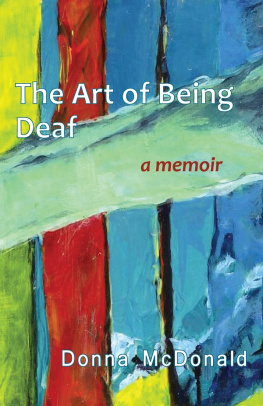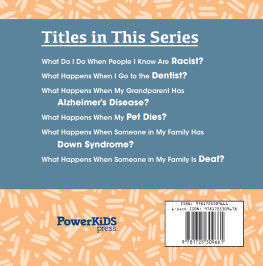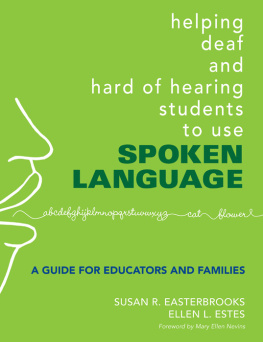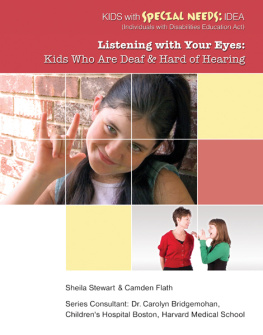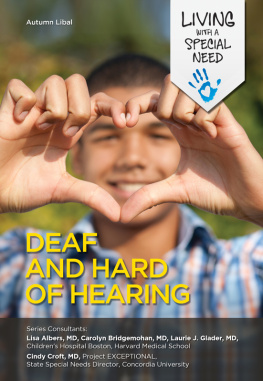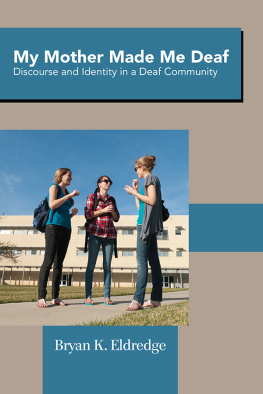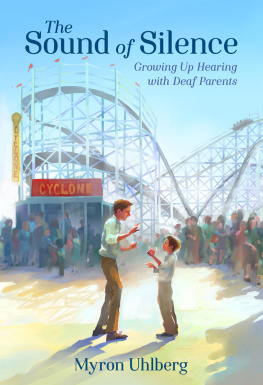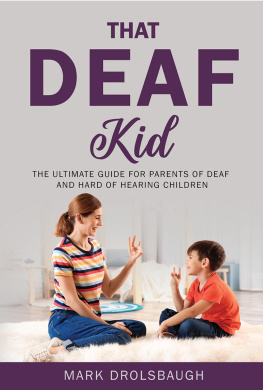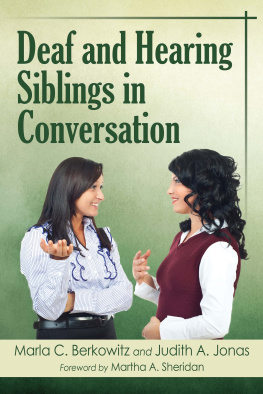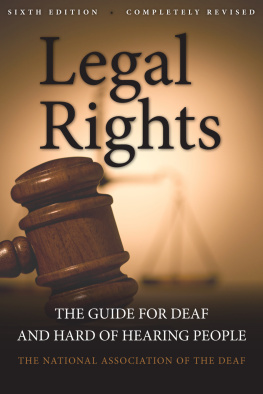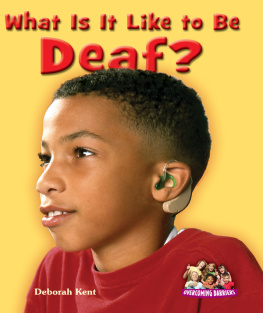

Gallaudet University Press
Washington, DC 20002
http://gupress.gallaudet.edu
2014 by Gallaudet University
All rights reserved. Published 2014
Printed in the United States of America
Library of Congress Cataloging-in-Publication Data
McDonald, Donna, 1955
The art of being deaf : a memoir / Donna McDonald.
pages cm
Includes bibliographical references.
ISBN 978-1-56368-597-2 (pbk. : alk. paper) -- ISBN (invalid) 978-1-56368-598-9 (e-book)
1. McDonald, Donna, 1955- 2. Deaf--Australia--Biography. 3. Deaf women--Australia--Biography. I. Title.
HV2943.M33A3 2014
362.42092--dc23
[B]
2013042489
Cover art and design by Donna Wright.
Some of the names in this memoir have been changed.
The paper used in this publication meets the minimum requirements of American National Standard for Information Sciences--Permanence of Paper for Printed Library Materials, ANSI Z39.48-1984.
The whole body was removed
From the vibration of air, they lived through the eyes
The clear simple look, the instant full attention.
Ted Hughes, Deaf School
Long-continued disability makes some people saintly, some self-pitying, some bitter. It has only clarified Sally and made her more herself.
Wallace Stegner, Crossing to Safety
Love is a central theme in the autobiography we each write as we try to understand our lives; but we may feel that we become only more confused the more we reflect upon it.
John Armstrong, Conditions of Love: The Philosophy of Intimacy
Gratitude is the memory of the heart.
Jean Massieu, 17721846, deaf student and teacher in France

Contents

Prologue
Through the Eyes of a Child
If you had been walking across the William Jolley Bridge that sultry February morning, and if you had been looking out for it, you would have seen a cream-colored car with absinthe-green panels. A new 1957 Holden, it pointed south toward the Oral Deaf Preschool at Yeronga, a suburb of Brisbane, in Queensland, Australia. You would not have understood the significance of its journey at the time. Not even the participants in that journey could have reasonably anticipated what would follow in the years to come. The car was heading not just to a school, but to an entire new world of opportunity, a world that promised spoken speech as well as an education for little deaf children.
The driver of the car was my mother, a thirty-three-year-old woman with dark brown hair. She wore black-rimmed, bat-wing-style glasses that framed her olive-green eyes. The fierceness of her glasses was softened by her summer frock with its pattern of roses and a cinched waist. My mother looked ahead of the car in front of her and saw that the pace of the traffic had faltered. She pulled on the cars gearstick and tapped her fingers impatiently on the steering wheel.
I sat in the back seat of that car. I was three years old and had wispy blonde hair and a dimple in my left cheek when I smiled. But now my chin was crumpled in a fury of crying. A breeze filtered through the open windows. It lifted my hair off my forehead but did not ease the red flush of my face. My cries must have sounded like the tearing of metal. My shrieks ebbed into the defeat of hiccoughs before gathering new strength for another onslaught of rage. I grabbed my left ear as if to peel it from my head. A pink button was pushed into its ridges and hollows. The plastic cord dangling from it was attached to a metal box the size of a cigarette pack, encased in the pocket of a grey gabardine shoulder harness strapped around my body. I yanked at the cord once, my hand whitening with the effort. I yanked it again, and then I gave it the hardest yank of all.
My mother heard the catch of breath and glanced up at the rearview mirror just in time to see the pink button wrenched free from my ear. It popped out with a force that launched it up, up, and out, out into the air beyond the car window. The buttons cord traced a glorious arc before falling beneath the wheels of the cars behind us. I rested my head against the sticky vinyl of the car seat, my hair still fluttering in the breeze, my sea-green eyes blinking against the white clouds of softness falling into my ears.
When I choose to turn my hearing aids off and so switch off the world of sounds, I experience delicious relief. It is as if a sigh is breathing into my ears. My shoulders relax from their pinned to the ears position of strain. My face relaxes. Everything in me relaxes. I dont feel on alert to the world; I do not feel on guard. I am at home in my silence, free to fill it up with my own soundsthe sounds of memories, reveries, and hopes.
But I feel this only if the closure of sound is of my choosing: I panic if I am out and about and my hearing aids fail me in some way. I feel unsafe then, as if I have been blinded by a mudslide that I cannot find my way through. When I turn my hearing aids back on, the air momentarily becomes harsh and stinging. In that split second when sound crashes against silence, I must reengage with my world. I have to adapt each time, but once having adapted, I enjoy the return of the loud and the soft, the bellow and the whisper, the variety of sounds in all their musicality and clamor.
I was already feeling the strain of the appointment when the psychologist asked his question, in the form of a statement: Your hearing loss must have had a big impact on you?
I hesitated.
He turned it into a refrain. Your deafness? It must have been difficult?
Dust motes hung in the arrow of sunshine between us. He sat in a shadowy corner of the timber-paneled room, and I slouched in a low-slung chair beneath a cracked window. The distance between us was as vast as the Nullabor Plain, as arid as the Simpson Desert. The force of the psychologists words was muffled by his beard, fluffed up around his mouth and blurring the outlines of his words. Lipreading him from so far across the room was like trying to read fading print. I could make out the vowel sounds, but was that a p or a b? I stretched and flexed my fingers to release the tension in them, and closed my eyes for a few seconds. I struggled to sit up straight. The psychologist ran his right index finger around the inside of his shirt collar as if it was strangling him. His question hung in the air along with the dust motes. I used my arms to pull myself upright in the chair again and cast around for a way to deflect the psychologists question.
I was forty-five years old, but a childish refusal welled up in my chest. I did not want to answer this question. The bluntness of it offended me. It had lunged at me without warning, winding me. I had already answered many questions as precisely as I could about my work, for this was the reason I was there in his office. A social worker friend, Jennifer, had urged me to see him. We had worked together in disability policy on and off for fifteen years, and she had observed my mounting distress about the gap between my achievements in my public service career and my disappointments in romantic relationships.

